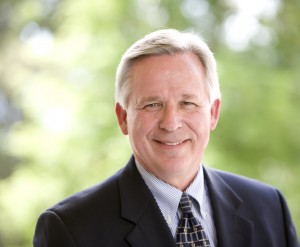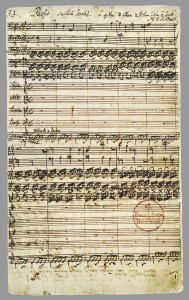The Cathedral of the Madeleine will be marking Lent, the season leading up to Easter, with a performance Sunday of J.S. Bach’s St. John Passion (Johannes-Passion), a work that was first performed on Good Friday in 1724 in Leipzig’s Nicolaikirche, one of the city’s two churches for which Bach had to provide music.
For Sunday’s performance the Cathedral Choir and Chamber Orchestra will be conducted by Craig Jessop, former music director of the Mormon Tabernacle Choir and current dean of fine arts at Utah State University. This will, in fact, be Jessop’s second time conducting the work in the cathedral. The last time was in March 2005, and he’s excited to have been asked to lead a performance of it again. “I’m really blessed to be able to do it,” he told Reichel Recommends in a phone interview. Joining Jessop and the ensembles will be tenor Christopher Watson (Evangelist); baritone Tyler Oliphant (Jesus); baritone John Buffett (Pilate); soprano Rachel Morris; countertenor Miles Romney; and tenor Robert Breault.
Jessop is also looking forward to continuing his long association with the Cathedral of the Madeleine. “The cathedral has been so close to me for so many years. I’m thrilled to work with [the choir] again.” He has nothing but praise for the cathedral’s music program and its choir school and for the people involved with them, especially choir school founder and now pastoral administrator Gregory Glenn and director of music Melanie Malinka. “I admire their high artistry and great spirituality and the top notch repertoire they do. It’s really amazing.”
Bach’s music belongs in this “top notch repertoire,” in Jessop’s opinion, and he is a composer who is close to his heart. In fact, he calls him his “desert island composer,” and says he never gets tired of listening to his music. “I can never find the bottom of it. The more you dig into it, the more layers you discover.” And in Jessop’s mind there is nothing in the entire collection of religious art, both visual and aural, that even comes close to Bach’s St. John and St. Matthew Passions in depicting the emotional scope and depth of Jesus’ suffering and crucifixion. “Nothing conveys the power of passion week better that these two works.”
The two passions are quite different from each other, Jessop said. “The Matthew is pieced together so immaculately. It’s architecture flows so effortlessly.” The St. John, on the other hand, is edgier. “It’s a little more angular and has more of an edge to it.” And it’s also the more difficult of the two. “The choruses are more intricate and there are several tricky passages in them.”
But for Jessop, the most spectacular parts in the two passions are the chorales. “Some of the most moving moments are the chorales. They are stunning in their simplicity.” They also offer the listener bits of familiarity and repose from the polyphonic intricacies of the rest of the score. “These are the [tunes] that the people would know the best.”
But perhaps the real genius of the two passions lies in the recitatives. “In Bach, and in Mozart, the recitative reaches a high water mark,” Jessop said. “The recitatives of the Evangelist are absolutely astounding. In their beauty they’re much like Bach’s solo cello sonatas.”
Jessop has a long history with the St. John Passion. He heard it for the first time when he was a high school student in his native Cache Valley. “Bill Ramsey did a performance of it at Utah State as part of his doctoral dissertation.” And it was Ramsey, who became Jessop’s teacher and mentor at USU, who introduced the young singer to the world of Bach’s music. “He did a lot of Bach, and I owe a lot to him.”
And that love of Bach’s music Jessop has has stayed with him throughout the years. He sang the German master’s music at the Carmel Bach Festival when he was a student at Stanford. He also sang Bach’s three major choral works — both passions and the Mass in B minor — at the Oregon Bach Festival under Helmuth Rilling. And it was Jessop who gave the first performances of the St. Matthew Passion and the B minor Mass in Logan.
“These are all works that need to be heard and performed,” Jessop said. “The St. John Passion is one of the great monuments of religious sacred art. And during Lent, there is no better work for Christians to come together and hear the message of the season.”
- PERFORMANCE DETAILS
- What: J.S. Bach, St. John Passion
- Venue: Cathedral of the Madeleine
- Time and Date: 8 p.m. March 23
- Tickets: Free, but seating passes required
- Phone: 801-994-4663
- Web: www.utmcs.org


